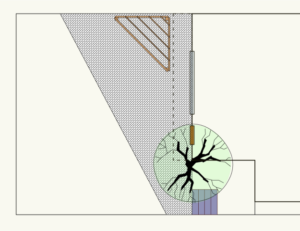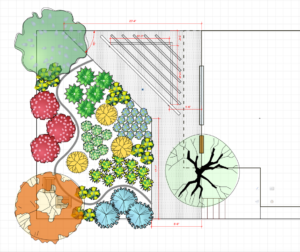I’ve been looking at maps this week in my spare time and it was Purim over the weekend. Purim is an historical festival, not so much a religious one, so I always try to make sense of a bit more Jewish history as my learning for the celebration. I was perplexed as a child when non-Jewish families didn’t do learning as part of their celebration. This is a tradition. My tradition is not that of Fiddler on the Roof! and the song “Tradition”. It is learning and food, much food. There are many Jewish cultures. Learning is one of my favourite bits. It ranks as high as chicken soup.
When I was a teen, I had this conversation. It began with me asking, “What did you learn for Christmas?”
“I got these presents, let me show you. You show me your presents, too.” Chanukah collided with Christmas that year, as it did from time to time, but my friend was totally baffled when I showed her my present for fifth night, which was a small box of Smarties (Australian M&Ms). Me, I had present-envy. I didn’t get presents such as hers even for my birthday.
I am a slow learner. The next Easter I asked a Greek Orthodox friend.
“What did you learn for your Easter?”
“We didn’t learn. We dyed eggs red and cracked them.” She had some dye left over and we totally messed up my mother’s kitchen and destroyed many candles making decorated eggs. We didn’t crack them, because Easter was over. We put them in a bowl and left them on the counter until my father complained about the smell.
Later I found that not all Jews learn every festival. But it’s my tradition and I love it.
This year’s choice for Purim was propelled by the sad fact that historical research and research for novels all take planning. I was considering actual Jewish populations along the Rhine at different times for something I’m looking into later in the year. I had a crashing thought that had me investigating maps last week. I used Purim to give me the time to make everything make sense. Tomorrow I’m back to my regular resaerch, which is currently wholly in literary studies
For all this (except the literary studies), I blame cholent.
Cholent, the dish, is a Jewish slow-cooked casserole from (mostly) Eastern Europe. Its name, however, most likely comes from French. We talk a lot about European Jews migrating east, but the most popular explanations and timing don’t fit Western European history. Yiddish is a lot more recent than the first migrations, and… it’s complicated. I made it understandable using maps. The maps themselves don’t explain things – they triggered the explanations, which is why there are no maps in this post and only one link to one. I answered a lot more questions that night and this weekend than I could give in a post – the question of Jewish movement eastward, for instance, must wait.
I began with a map of the Roman Empire at its pre-Christian peak. There were millions of Jews distributed throughout the Roman Empire as citizens, as non-citizens, and as slaves. I’ve seen estimates of numbers ranging from one million to ten million, and I usually use four million as a compromise number to work with.
Four million is over a quarter the size of the modern world Jewish population so, a while back I calculated how many Jews we would have around today if history had been kinder. It was in the vicinity of 320 million. Eighty million if you take the minimum number of Jews in the Roman Empire and over a billion using the largest estimate. We would not be such a tiny minority, in other words, if we had progressed simply because the world population has expanded and we had not been forcibly converted, mass murdered, exiled, enslaved, enthusiastically converted to other religions and so forth.
Populations follow trade routes and you can see evidence Jewish life along all the Roman trade routes. Well, all those where anyone has looked. Antisemitism is so deeply ingrained in our societies that many experts demand far more evidence for a Jewish burial than, say, a Christian one. There is a lot that probably needs to be re-evaluated in the archaeological record if we want to know actual Jewish populations in most areas.
Assessing the written record is easier, but not in a good way. The vast majority of Jewish records have been destroyed, and we’re reliant on surprising survivals such as the Cairo genizah. This means our knowledge through writing is patchy from anyone Jewish, because of the destruction, and biased from anyone else. Occasionally the bias is positive. Occasionally.
This means we really don’t know a lot about how many Jews lived in the Roman world, where they lived and how they lived. We know a lot more than we did, but we still have big gaps. We do know, however, the geographical limits of Jewish life and the trade routes related to much of the Jewish everyday.
The next map I thought of, then, was of Charlemagne’s empire at the time of its division into three, 843. I was thinking of places that were more antisemitic and less antisemitic and they pretty much follow this divide. It was easier to be Jewish in the central band of the empire (the one with Charles’ capital – which makes sense, because his personal confessor converted to Judaism and this does not seem to have ended the world) and a few key places nearby. These are all, in modern day Europe in eastern France (usually the parts that also speak German), the Saar, Italy, Provence and Burgundy. This became the Jewish heartland of non-Hispanic Europe in the Middle Ages.
It is the original Ashkenaz. It’s the Ashkenaz that made European Jewish marriages one husband to one wife, but refused to relinquish divorce despite enormous pressure from local Christians. Rashi, one of the great Medieval scholars, used the word ‘akitement’ for divorce: marriage in Judaism was and is a contract that can be acquitted, it’s not a covenant. European Jewish was both Jewish and European and that wide strip of territory that formed that heartland explains a great deal about us.
Ashkenazi culture spread east and changed and that’s a story for another time. It began to spread early enough so that ‘cholent’ could have a French name: it came from the Carolingian Empire after French developed as a language. Not before the eleventh century. Which is interesting because… I have another mental map for that.
In the late 8th century, a Jewish trade network operated from that region (and possibly Champagne). We don’t know a lot about it, but when I looked at its most known route, Jewish traders used those ancient fairs, with a special focus on Medieval fairs. I have a book with maps of every town in that region that had a fair in the Middle Ages and the dates we know those fairs operated and I cannot find it! So this is work for my future, after my thesis is done.
The Rhadanites were gone about the time that the Khazar Empire declined and fell, and one of their trade routes led to the heart of the Empire, so that’s something else to explore one day. About the time both faded from view, the Crusades began in Europe and persecution of Jews became far more severe. But… right until the mid-20th century, those towns were part of larger trade routes and had Jewish communities.
Every trade fair needed a route to the fair, and each stop was a town usually between 15-20 miles from the previous and also served as fairs for local farmers. In the Middle Ages, prior to all the murders and expulsions, so many of these towns had Jewish traders and craftspeople. And so many of those families would have cooked cholent or an equivalent.
This is a small fraction of what I spent one night and one Purim sorting out. I have to leave it now until September. I’ll write it up more accurately and less improperly when I’m actually working on it. In other words, these are my early thoughts.
Why did I share them with you, then? Part of the family tradition of learning includes talking about things. If anyone wants to talk about these subjects, this is a good place and a perfect time. Why perfect? Because all my thoughts are halfway right now. I could be very, very wrong in how I see things.
There is a tradition to this learning. The tradition is that you have to prove anything you want to challenge. Evidence! When I was a child and we argued without evidence it occasionally led to very sophisticated behaviour, such as the sticking out of tongues, which got us into trouble. Evidence is safer than the sticking out of tongues.
What’s the aim of challenging and providing evidence? That the learning may continue… (kinda like the spice must flow).


 Twenty odd years ago, when we moved to San Francisco from New York, we bought a house. That flat statement doesn’t reflect the year of living in a rented flat, looking for a house that 1) met our inscrutable criteria for size, price, amenities (this above all: a garage!), proximity to public transport, and some degree of walkability. We were unbelievably fortunate that we sold our NYC apartment for enough to give us a competitive down payment, even in SF (which was then in a wave of utter insanity, real estate-wise). Still, what we wound up with was not one of the gorgeous Victorians with which San Francisco is blessed, but a modest two-bedroom house with a semi-finished attic which would do as a third bedroom, a garage, and a rather feral back yard. Over the years we have made improvements (a workable kitchen which is still my delight; new furnace, new water heater, new bathroom). And this week we started on a massive project: new back yard.
Twenty odd years ago, when we moved to San Francisco from New York, we bought a house. That flat statement doesn’t reflect the year of living in a rented flat, looking for a house that 1) met our inscrutable criteria for size, price, amenities (this above all: a garage!), proximity to public transport, and some degree of walkability. We were unbelievably fortunate that we sold our NYC apartment for enough to give us a competitive down payment, even in SF (which was then in a wave of utter insanity, real estate-wise). Still, what we wound up with was not one of the gorgeous Victorians with which San Francisco is blessed, but a modest two-bedroom house with a semi-finished attic which would do as a third bedroom, a garage, and a rather feral back yard. Over the years we have made improvements (a workable kitchen which is still my delight; new furnace, new water heater, new bathroom). And this week we started on a massive project: new back yard. I have to say, both Danny and I found it hard to really wrap our heads around this as a “here’s what you’ll wind up with” model until we went out back (stepping carefully around the debris) and paced things out. Then we gave the designer some feedback, he made adjustments, and proceeded to send back an image with a rough planting plan thrown in. This time (maybe because there’s some color) I felt more comfortable. There’s a secondary seating area (in the lower left corner) and a “path” among the plantings.
I have to say, both Danny and I found it hard to really wrap our heads around this as a “here’s what you’ll wind up with” model until we went out back (stepping carefully around the debris) and paced things out. Then we gave the designer some feedback, he made adjustments, and proceeded to send back an image with a rough planting plan thrown in. This time (maybe because there’s some color) I felt more comfortable. There’s a secondary seating area (in the lower left corner) and a “path” among the plantings.